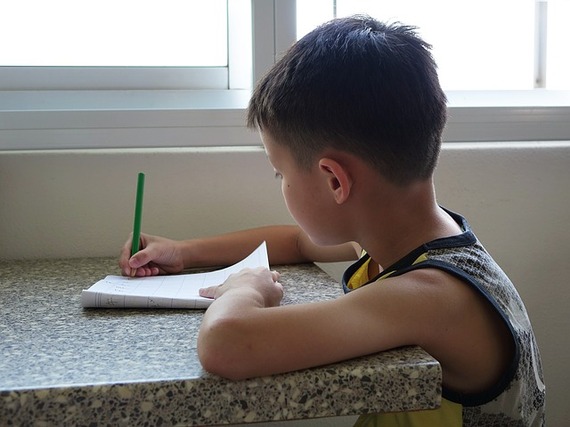There may be some children who glide through their academic careers exhibiting a joy in the learning process with minimal difficulties, but I have yet to meet them. Children will find subjects they aren't interested in or don't like, teachers with incompatible personalities, and social confrontations that distract them from the schoolwork. All of this is completely normal and doesn't even begin to take into account learning disabilities and delays, family situations, or health problems that may come up. It would be impossible to cover serious medical issues or learning disabilities with this, so I'll focus on what parents can do to help their children weather the somewhat standard hurdles of boredom, teachers, and peers.
Create an Education Zone
When I ask my son if he has homework, he usually tells me no. I remember being a teenager, and if I told my parents I didn't have homework that meant I was free to do what I wanted for the rest of the afternoon and evening. The problem is, even if a child doesn't have homework they must finish, because they completed it quickly and without absorbing any of the material or because their educational setting isn't challenging enough, they should still be doing academic work at home.
Routines and environment are key to creating an effective home education zone for your child. Designate a time for academic pursuits that happens every day. This doesn't necessarily mean the child needs to be completing a class assignment. Of course, they would use this time to complete homework, but having this time as part of their daily routine helps them establish a work ethic of doing more than the minimum required to get by. It is also an excellent opportunity to give them ownership of their academic pursuits. If they are bored by a subject, they can use this time to research a different aspect which they find more interesting.
Part of the routine includes having a specific place to study. The right environment doesn't have to be elaborate or expensive. Students need access to comfortable seating, minimal distractions, and basic office supplies. Can they study while lying down with the television on and texting friends periodically? It's possible, but highly unlikely they will actively pursue academic interests with so many other tempting options.
By setting aside time every evening that will be spent in the pursuit of knowledge, one never needs to ask if a child has homework. They know they will be working; it is only a matter of the specific task they will work on. This eliminates the temptation of finishing assigned work quickly and poorly while encouraging an attitude of lifelong learning.
Create a Safe Space
When children face social criticism from their peers they often feel they have no place to turn. Teachers aren't to be trusted, parents won't understand, and their peers might turn on them at any moment. Talking to a child about this when they are in the midst of a social nightmare usually doesn't work due to the heightened emotions. It is better to make sure children have a plan for who to turn to and how to handle individual situations before stressful situations occur.
There are several steps involved in creating a home environment that feels emotionally safe enough for children to open up about anything they are experiencing, even the awkward or scary feelings. Children need to know the adults around them will allow them to listen without judgment and without trying to solve the problem immediately. They need to have their emotions validated, and they need role models who express emotions appropriately. If you recognize your child has difficulty opening up to you, enlist the support of a religious leader, family member, or family friend.
Help Your Child's Teacher
Occasionally, the biggest hurdle for your child will be the classroom environment or the teacher. This isn't necessarily because the teacher is incompetent or inherently a bad person. If they are, the first step is a conversation with an administrator. Instead, many teachers are facing hurdles of their own. First year teachers have virtually no classroom experience. Established teachers may have a student to teacher ratio that makes providing individual attention challenging, if not impossible. Others may find themselves in a setting with insufficient resources to help students achieve their academic potential. If any of these are contributing factors to the challenges your child is facing, give the teacher your support.
New teachers who are struggling to communicate with students and parents might find the use of a classroom management app or class website a lifesaver when it comes to forging cooperative relationships with parents. Teachers who are struggling to find educational resources are often surprised to learn of the many free classroom resources and classroom grants they may be eligible for. If your child's teacher simply doesn't have enough help, consider organizing the parents to create a rotation of class parents and volunteers. Yes, it's possible to do this even in middle school and high school, although the role is slightly different than for elementary school parents.
The educational hurdles your child will face throughout the course of their academic studies, are usually due to a lack of structure, emotional stress, or poor classroom management. While people tend to focus on learning difficulties, they are usually secondary to one of the other issues. Even if your child has a learning or physical disability, they will benefit from the structure of a routine, an emotionally safe home environment, and teachers who feel supported by the parents.
Photo Credit: Pixabay

